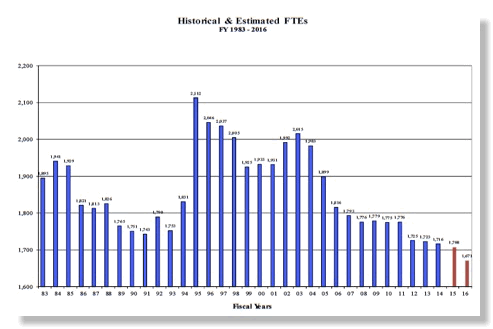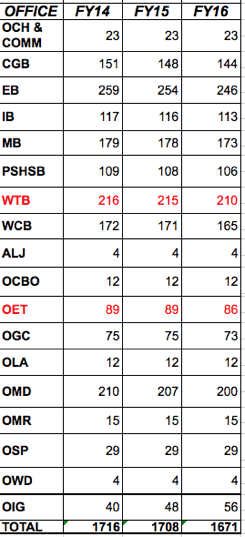Observations on FCC FY16 Budget

This week the President released the proposed FY2016 Budget of the US and most agencies simultaneously released their proposed budget - actually their original proposal as modified by OMB in a multi month off the record process in parallel with all other agencies’ budgets. (FCC may be an “independent agency” in many respects, but in budget matters it is treated as a member of the Executive Branch.) As usual, FCC posted it in an obscure place on its website without public announcement. However, a few days later for the first time in the history of the FCC website it showed up in the rotating headlines in the upper left corner of the FCC’s homepage. Here is a link to the FCC’s FY16 Budget Proposal to Congress.

Note also that that the WTB/OET team is actually a profit center for the US Government as the recent auction results show. Yet both are drifting down in size. Some might say attrition. So while FCC faces real backlogs with dealing with new technology issues such as millimeter waves that threaten US technical leadership and also with resolving interference issues that need policy decisions that threaten the operation of incumbent licensees, the staff working on these issues will actually decrease.
What is increasing? As can be seen in the next to last line of the table, the FCC’s Inspector General’s staff is increasing from 40 to 48 to 56! The justification fro this is to fight Universal Service Fund fraud. When AT&T was a monolithic near monopolist it was agreed between them , FCC, and Congress that they would transfer money around within AT&T to subsidize rural local telephone rates with income from long distance calls. This worked well until divestiture in 1984. USF was the replacement mechanism for the old money flows internal to the old AT&T. Billions of dollars flow through the USF from our phone bills and fraud is inevitable as FCC seeks to encourage new technology with the program. So there is nothing wrong with increasing attention to such fraud and it is actually cost-effective for the tatx payer to reduce the fraud.
But, as we have pointed out previously and repeatedly, despite the good and important work OIG does on USF fraud, that is not the whole job of that office under the terms of the Inspector General Act. Until the current IG, all the previous ones were cronies of the Chairman and long term FCC staffers. They did not want to find unpleasant things that would reflect poorly on their patron. Even though the current IG is unlike his predecessor in background, he seems to follow the office tradition he inherited of not asking questions about how well FCC is run. Other agency IGs do and their statutory charter is exactly the same. So if the FCC IG gets 56 FTE in FY16 will he break with the past and use some of this for the matters he and his predecessors have been carefully avoiding in the past?
blog comments powered by Disqus



![Validate my RSS feed [Valid RSS]](valid-rss-rogers.png)

